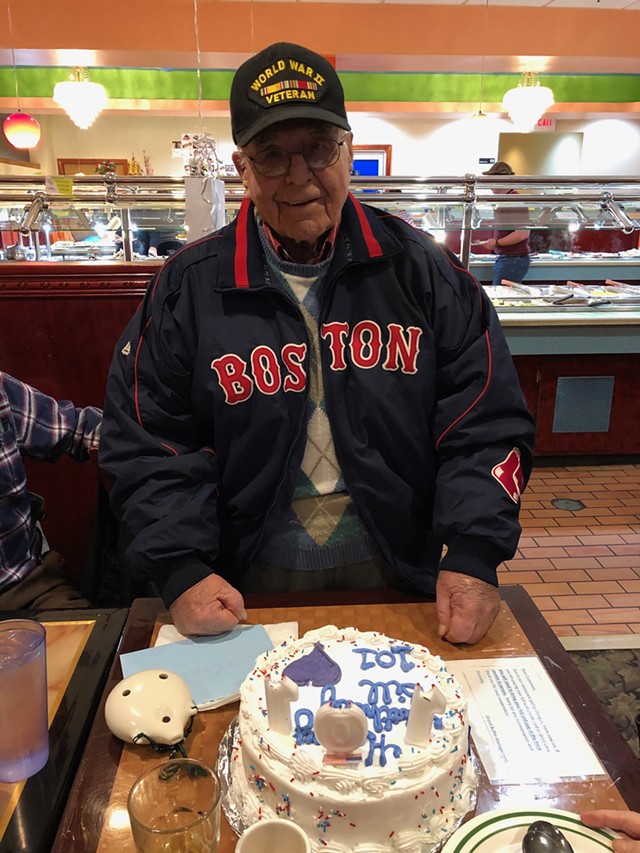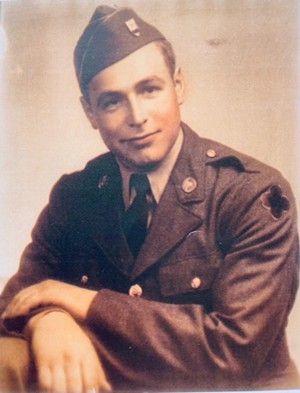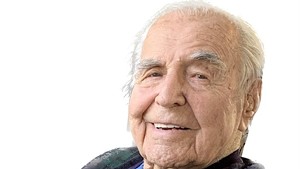
- Courtesy
- Bill Busier on his 101st birthday
That’s OK, said Busier, who doesn’t sweat the small stuff. He also seems to shrug off the momentous, including how he reached the age of 105.
“I have no idea,” Busier said on Tuesday, his last day as an 104-year-old. “I just kept my nose clean and minded my own business.”
The Vermont Department of Health doesn’t keep records on the oldest Vermonter. But according to his family, Busier is the oldest prisoner of war in the state. He was captured by the Germans at the Battle of the Bulge in December 1944, Busier said. After a four-day forced march through snow and a train ride in a car packed with soldiers, Busier was held in a POW camp until March 1945.
“We thought about food, what [our] mothers made,” he said of his time as a prisoner. “That’s all we talked about.”
Busier grew up on a farm in Shelburne, where his father grew sweet corn and milked cows. "It's not a farm if you don't have cows," he said.
His parents worked at the Webb estate on Lake Champlain before it became the nonprofit Shelburne Farms. His father, Bernard, grew flowers and strawberries on the land; his mother, Helen, was a pastry chef, his daughter, Holly, said.
Busier left Vermont as a teenager to work on a Civilian Conservation Corps crew in Massachusetts, where he helped build dams, among other projects. He joined the National Guard in 1940 and was on board the SS President Coolidge when the vessel, nearing its destination of Espiritu Santo, hit an American mine in October 1942. The boat sunk in the South Pacific.
“I helped get people out of there,” Busier said. His rescue efforts were rewarded with a Soldier's Medal, according to his daughter.
Back in the United States, he went to infantry school. Toward the end of the war, Busier traveled to England on the Queen Elizabeth. After about a month in England, where he trained to deactivate German arms, Busier sailed across the English Channel to France. Then Busier, a platoon sergeant, traveled with the 106th Division in a convoy of trucks to the front lines of Belgium.
That's where he was when he was captured by the Germans. Busier was "heartbroken," Holly said, when he was ordered to smash his firearm and surrender.
In the POW camp, Busier contracted malaria.
“I thought I was going to die, but I didn’t,” he said. “I been through quite a few things there. I didn’t even think I’d make it, but I did.”

- Courtesy
- Bill Busier
At the camp, Stalag IX-A, Ziegenhain, the soldiers slept two to a bunk, lying on their sides. If one man moved, the other did, too. They kept their shoes on when they slept; if they took them off, someone would steal them.
“In the morning, they had so-called coffee,” Busier said. “But it wasn’t coffee. We used it to wash off.”
The prisoners ate soup at noon and bread at night. One loaf, with nothing on it, fed seven people.
“There’s nothing else to do in that place,” Busier said. “Just go get the food and eat it.”
When U.S. forces liberated the camp, he said, “everything was OK.”
“The Americans fed us for a few days,” he said. “And after we got feeling better, they brought us on C-47s. They flew us from there to Camp Lucky Strike [in France], across from England.”
The soldiers ate doughnuts and fruit; they took showers and put on clean clothes. After traveling to England, they boarded a ship for the United States. Busier recalled that President Roosevelt died while he and the other troops were about halfway across the Atlantic.
Back in Vermont, Busier worked in a Burlington ice cream plant, where the flavors he made included orange-pineapple. Then he built a career in the refrigeration and air-conditioning business. He ran his own company before employment with Vermont Heating and Ventilating.
“I worked hard, a lot of hours,” he said. “But I enjoyed every minute of it. I liked the work. I like to see what you accomplished.”










Comments
Comments are closed.
From 2014-2020, Seven Days allowed readers to comment on all stories posted on our website. While we've appreciated the suggestions and insights, right now Seven Days is prioritizing our core mission — producing high-quality, responsible local journalism — over moderating online debates between readers.
To criticize, correct or praise our reporting, please send us a letter to the editor or send us a tip. We’ll check it out and report the results.
Online comments may return when we have better tech tools for managing them. Thanks for reading.